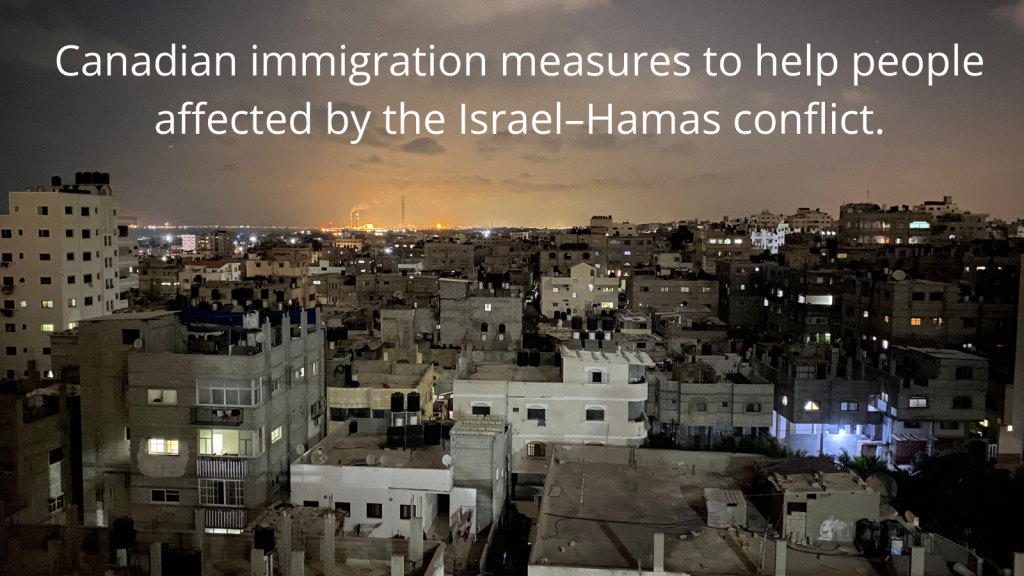by: Dana Kyle and Will Tao

Like many, we at Heron Law Offices have watched in sadness and anger for the loss of life in the Gaza area eminating from the current conflict between Israel and Hamas. Even using the word ‘conflict’ seems inappropriate for the gravity of the events over the past several months. Dana has provided a summary of IRCC’s announcement followed by Will’s brief analysis below. We understand also that this issue is politically charged. As a Firm, we have clients of both Israeli and Palestinian nationality and descent, including Gaza. We grieve and hold in our arms their mutual suffering at this time and pledge what we can do support policy development, feedback, and implemention through our immigration work.
IRCC’s Recent Announcement
Immigration Refugees and Citizenship Canada (IRCC) has announced temporary measures to support family members of Canadians and permanent residents currently in Israel, the West Bank, and Gaza. These measures are available over several IRCC websites. These are best navigated starting from the IRCC page here.
Beginning December 21, 2023, the Canadian Government announced that individuals who meet specific criteria can apply for fee-exempt study or open work permits. The individuals who qualify for this program are:
- Foreign national family members of Canadian citizens and Permanent Residents (PRs) who have left Israel and the Palestinian Territories, either with their family members or of their own accord since the onset of the current conflict.
- Israelis and Palestinians already in Canada who feel unsafe returning to the region at this time.
To be eligible to apply for fee-exempt study or work permits, immediate family members of Canadian citizens and permanent residents already in Canada must have valid temporary resident status. As the IRCC website states:
“Eligible applicants include the spouse, common-law partner, child (regardless of age), grandchild, sibling, parent or grandparent of a Canadian anchor, as well as their immediate family members (spouse, common-law partner, dependent child, and dependent child of a dependent child). The Canadian citizen or permanent resident must be currently residing in Canada.”
The Canadian Government has also committed to prioritizing the processing of all new and existing applications for permanent residence for Palestinian nationals within existing family-based immigration streams.
“The scale of this humanitarian crisis is devastating and the situation on the ground is challenging. Israelis and Palestinians in Canada will continue to find safety here and we will do what we can to help loved ones who have fled the region, as well as eligible family members who remain in Gaza. We will continue to remain flexible with our response so we can meet the unique needs of those who require our support.”
– The Honourable Marc Miller, Minister of Immigration, Refugees and Citizenship
More details about these special measures for extended family members of Canadians (including how to apply) are not yet available, and will be announced soon according to IRCC. Based on the press conference, it appears that the Temporary Resident Visas (TRVs) provided to family members of Canadian citizens and permanent residents will be for a duration of three years.
In the interim, the Canadaian Government Government encourages Canadian citizens and permanent residents who may have eligible family members to start preparing and gathering documents such as proof of relationship. This may include things like birth certificates, baptismal certificates, and any other documents that show proof of relationship.
If individuals are able to exit Gaza, they will need to complete all admissibility and eligibility requirements before they can be approved to come to Canada. As such, (although the applications are fee exempt) the feasibility of applying to come to Canada under the current circumstances remains to be determined.
IRCC is also seeking to process applications faster from Lebanon, although have posted only a few details here.
Will’s Analysis
I think the Canadian Government’s intervention through policy, in light of humanitarian concerns, was inevitable if not a little too late and not going far enough.
That being said, I see any movement to assist as positive, but also necessarily complicated. I have concerns about how operationalization and implementation will ultimately work. Furthermore, given the Canadian Government’s adherence to security screening applicants from the region (particularly into likely understanding the political/organizational affiliations) and with Afghanistan as the most recent/clearest template, I do suspect significant vetting that will delay arrival of individuals. It is more likely we will see women and children arrive, then complete families.
Forming even a more complex layer to this issue is whether the movement of individuals is how to address this as a temporary resident versus permanent resident solution. This draws more parallels with Ukraine, where the Canadian Government tried to go a different direction than the usual refugee resettlement route. I think the key is to make permits/visas multiple entry and to allow for return to Gaza when (and hopefully if) the situation is able to return to one of liveability.
This case is frankly a diplomatic nightmare for Canada right now, navigating what is a very tenuous international position. My only hope is that this move helps, as it appears to do in intent, support the preserving of life.



